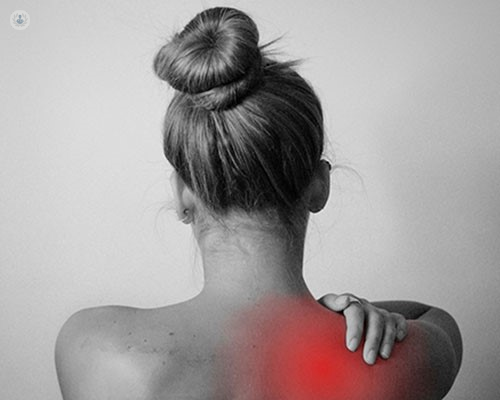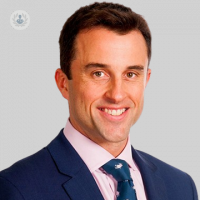Pain relief after shoulder arthroscopy
Written by:Shoulder arthroscopy has revolutionised the management of various shoulder conditions, offering patients minimally invasive solutions and faster recovery times. However, despite its advantages, postoperative pain and inflammation can still hamper the recovery of some patients undergoing shoulder surgery.
Where this happens, Joint injections can provide valuable adjunctive therapy in the post-arthroscopic phase, aiding in pain management and promoting better outcomes. In his latest online article, Mr Jeremy Granville-Chapman delves into the significance of joint injections following shoulder arthroscopy and explores their mechanisms, benefits, and potential considerations.

Understanding shoulder arthroscopy:
Shoulder arthroscopy is a keyhole surgical procedure performed through small incisions around the shoulder. It allows orthopaedic surgeons to visualise and treat many shoulder conditions, including rotator cuff tears, labral tears, impingement, frozen shoulder and shoulder instability. Compared to traditional open surgery, arthroscopy typically results in less tissue damage, reduced pain, and faster recovery.
Challenges post shoulder arthroscopy:
While shoulder arthroscopy offers numerous benefits, patients can still experience postoperative pain and inflammation. This discomfort can hinder rehabilitation efforts and delay return to normal activities. Traditional pain management strategies, such as oral medications and physical therapy, may not always provide adequate relief, prompting the need for alternative approaches in a minority of patients.
The role of joint injections:
Joint injections, including corticosteroids, hyaluronic acid, and platelet-rich plasma (PRP), have gained popularity as adjunctive treatments in the shoulder. These injections target the affected area directly, delivering medication or biological agents precisely to the site of inflammation. By doing so, they aim to alleviate pain, reduce swelling, and enhance the healing process.
Corticosteroid injections:
Corticosteroids are potent anti-inflammatory medications commonly used in joint injections. They work by suppressing the immune response and reducing inflammation within the joint. Following shoulder arthroscopy, corticosteroid injections can provide significant pain relief and improve shoulder function. In inflammatory conditions, such as frozen shoulder, many surgeons use corticosteroid adjunct treatment to help their patients’ recovery from surgery.
Hyaluronic acid injections:
Hyaluronic acid is a natural component of synovial fluid, which lubricates and cushions the joints. Injections of hyaluronic acid can restore the lubricating properties of the synovial fluid, thereby reducing friction and improving joint mobility. While evidence supporting the use of hyaluronic acid after shoulder arthroscopy is limited, some studies suggest potential benefits in certain patient populations.
Platelet-Rich Plasma (PRP) injections:
PRP injections involve isolating and concentrating platelets from the patient's own blood and injecting them into the affected joint. Platelets contain growth factors and cytokines that promote tissue repair and regeneration. In the context of shoulder arthroscopy, PRP injections have potential to accelerate healing, reduce pain, and improve shoulder function. However, further research is needed to elucidate their optimal use and efficacy.
Considerations and future directions:
While joint injections have the potential to offer valuable benefits in the post-arthroscopic phase, several considerations warrant attention. Patient selection, timing of injections, choice of medication, and potential adverse effects are crucial factors to consider and ongoing research is needed to demonstrate clear treatment benefit, confirm safety and guide patient selection.
If you have questions about adjunct injections around shoulder arthroscopy do ask your surgeon who should be happy to discuss them with you.
Mr Jeremy Granville-Chapman is an esteemed consultant upper limb surgeon. You can schedule an appointment with Mr Granville-Chapman on his Top Doctors profile.


